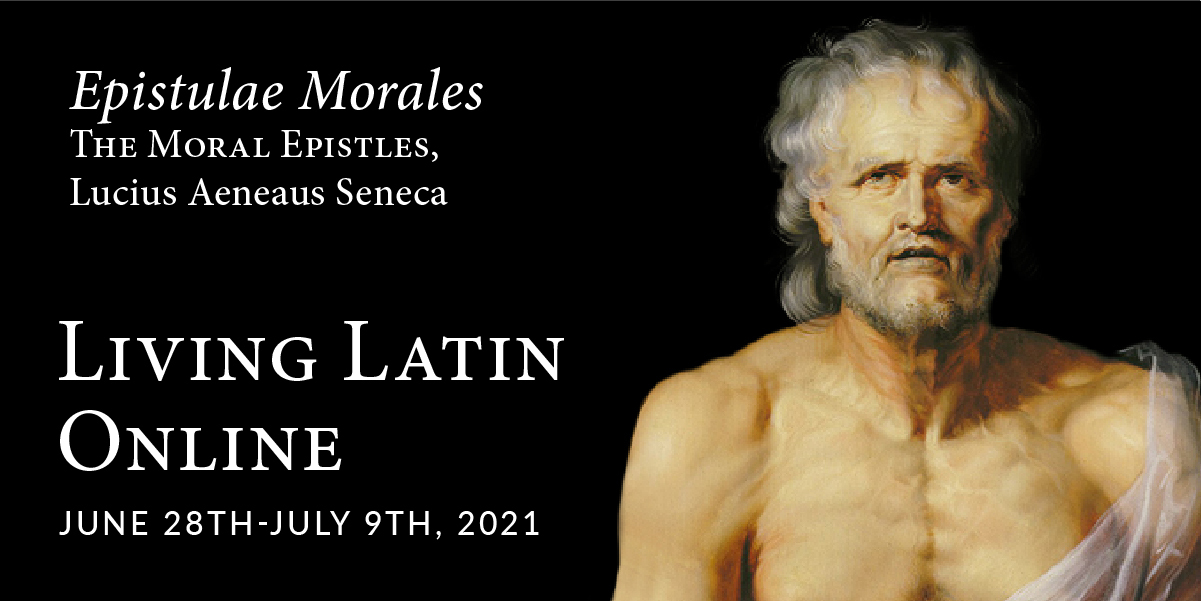
COURSE DESCRIPTION
Living Latin Online is an intensive online Latin experience designed to bring the dynamic experience of Paideia’s Living Latin study-programs to an online environment. The program includes daily intensive reading and discussion of Latin texts from across the history of Latin literature. The program's online sessions are designed to build students' facility in speaking and understanding Latin. According to participants' ability, the language of instruction is Latin. In addition to the daily sessions, there will be a lecture providing further historical and philosophical background relating to the program theme.
This summer's session of the Living Latin Online program will be dedicated to Seneca’s Moral Epistles to Lucilius. Through his letters, Seneca explores the relationship between teacher and student, between author and reader, and between expressing ideas and putting them into practice.
PREREQUISITES
This program welcomes students of all levels of Latin, from beginners through highly experienced Latinists. Students are grouped by level. The program's lower levels welcome beginning Latin students and include both reading of the texts in Latin and in English translation as well as a review of Latin grammar. The upper levels aim to read and discuss texts entirely in Latin. Paideia alumni and Nexus Members are particularly encouraged to apply.
TEACHERS
×
Curriculum Design Manager
Gene Cunningham
Gene currently manages the development of Paideia’s self-paced online Latin and Greek curricula. He is also the head teacher for Living Greek in Greece (High School). He holds an M.A. in Ancient Philology with an Emphasis in Teaching Ancient and Modern Languages from the Polis Institute in Jerusalem, and a B.A. in Classical Languages from the University of California, Berkeley. He has been involved with the Institute in several roles since 2012, when he first participated in Paideia’s courses in Europe, including Living Latin in Rome, Living Greek in Greece, and Living Latin in Paris. He was then one of Paideia’s first Rome Fellows, and eventually served as Assistant Director for European Operations, in which capacity he directed logistics for Paideia’s Travel Programs and Classical Tours.
×
Daniel Gallagher
After a decade of service to Benedict XVI and Francis as a papal Latinist, Daniel Gallagher was named the Ralph and Jeanne Kanders Professor of the Practice in Latin at Cornell University. He holds degrees from the University of Michigan, the Catholic University of America, and the Pontifical Gregorian University, and has published extensively in medieval philosophy, especially in the areas of metaphysics and aesthetics. He is passionate about handing on the Latin language based on the principles and method of his long-time mentor, Fr. Reginald Foster. Professor Gallagher currently lives with his family in Savannah, where he teaches literature and philosophy at Ralston College.
×
David Hewett
David Hewett is Paideia’s Outreach Manager for Classical Tours, as well as instructor in Telepaideia. He has an M.A. in Classics (2009) from the University of Virginia and began a dissertation there on Seneca’s Epistulae Morales, before starting his position at Paideia. He has been a Regular Member of the American School for Classical Studies at Athens (2011-12), a student at the Intercollegiate Center for Classical Studies in Rome (Spring 2005), and holds a B.A. in Classical Studies from Dickinson College (2006). In addition to this formal education, he studied with Reginald Foster in Rome (2006-07). He lives in Philadelphia.
×
Instructor Living Latin in Paris 2022/23
Jenny Teichmann
Jenny studied German and Slavic philology in Greifswald, European Cultural History in Frankfurt/Oder, and Classics at Humboldt University Berlin. She has been working as a Latin and Ancient Greek instructor for the Paideia Institute since 2019 and as a Curriculum Designer since 2022. Jenny is co-founder of the language school Τρίοδος Trivium and runs a popular Ancient Greek YouTube channel under the same name.
PLATFORM AND SCHEDULING
Sessions for Living Latin Online will be held using free video conferencing software. Each course meets for one two-hour block per day, Monday through Friday. All that is necessary to participate is a computer or phone connection. Sessions will be scheduled based on participants’ time zone and availability so students from all over the world are welcome to apply.
TUITION AND FEES
The tuition for Living Latin Online is $500.
SCHOLARSHIPS
The Paideia Institute is able to offer a number of full and partial scholarships to participants with financial need. Please visit our scholarships page to learn more.
ENROLL
The Enrollment deadline for this program is June 1st, 2021.
Enrollment and Payment





